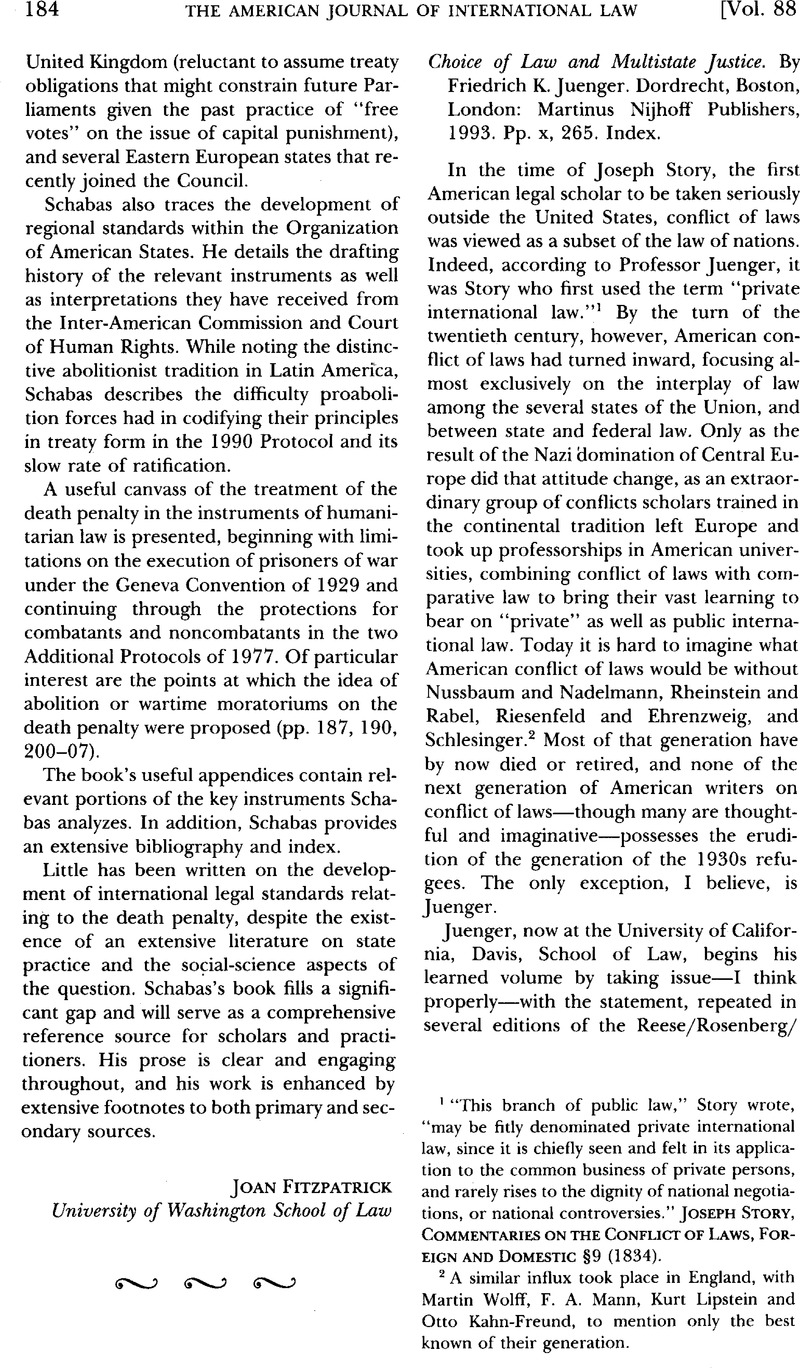No CrossRef data available.
Published online by Cambridge University Press: 27 February 2017

1 “This branch of public law,” Story wrote, “may be fitly denominated private international law, since it is chiefly seen and felt in its application to the common business of private persons, and rarely rises to the dignity of national negotiations, or national controversies.” Joseph Story, Commentaries on the Conflict of Laws, For eign and Domestic §9 (1834).
2 A similar influx took place in England, with Martin Wolff, F. A. Mann, Kurt Lipstein and Otto Kahn-Freund, to mention only the best known of their generation.
3 See Willis L. M. Reese, Maurice Rosenberg & Peter Hay, Cases and Materials on the Conflict of Laws 3 (9th ed. 1990). This passage crept into the casebook in the sixth edition, when Cheatham and Griswold withdrew from the book and Rosenberg joined as coauthor.
4 Allstate Ins. Co. v. Hague, 449 U.S. 302, 306–07 (1981).
5 It is interesting that Professor Cavers, anxious to shed the epithet “justice in the individual case,” expressly denies that he is the intellectual heir of Aldricus. David F. Cavers, The Choice of Law Process 86 (1965).
6 Juenger also surprised and pleased me by pointing out what I had never noticed: that a translation of Huber’s famous dissertation is reproduced as a footnote, apparently added by Dallas, to the report of an unimportant decision of the U.S. Supreme Court. Emory v. Grenough, 3 U.S. (3 Dall.) 369, 370 (1797). Interestingly enough, the anonymous translator renders comitas as “courtesy.” Story and later translators, of course, preferred the word “comity,” but when the Supreme Court undertook to define that term a century later, it said comity is “neither a matter of absolute obligation, on the one hand, nor of mere courtesy and good will, upon the other.” Hilton v. Guyot, 159 U.S. 113, 163–64 (1895).
7 In re Paris Air Crash of March 3, 1974, 399 F.Supp. 732 (CD. Cal. 1975).
8 The Bremen v. Zapata Off-Shore Co., 407 U.S. 1 (1972).
9 Cardo v. Cardo, Judgment of July 11, 1968, 94 BGE II 65 (Fed. (Supreme) Ct., Switz.).
10 “Who brings many things, will bring something for everyone.” From the prologue to Goethe’s Faust.
11 Babcock v. Jackson, 12 N.Y.2d 473, 191 N.E.2d 279, 240 N.Y.S.2d 743 (1963).
12 Schultz v. Boy Scouts of America, Inc., 65 N.Y.2d 189, 480 N.E.2d 679, 491 N.Y.S.2d 90 (1985).
13 Justice Edward M. Horay in Himes v. Stalker, 99 Misc. 2d 610, 616, 416 N.Y.S.2d 986, 990 (Sup. Ct. Cattaraugus Cty. 1979), quoted by Juenger at 110.
14 See Friedrich Juenger, Choice of Law in Interstate Torts, 118 U. Pa. L. Rev. 202 (1969).
15 Compare the similar argument made by Cavers a generation ago. Cavers, supra note 5, at 84–87.
16 See text at note 10 supra.
17 For instance, the choice-of-law rules proposed in chapter 6 of the ALI Complex Litigation Project (P.O.D. 1993), against whose adoption Juenger has vehemently argued.
18 “There I stand, a poor fool, and am no wiser than before.”